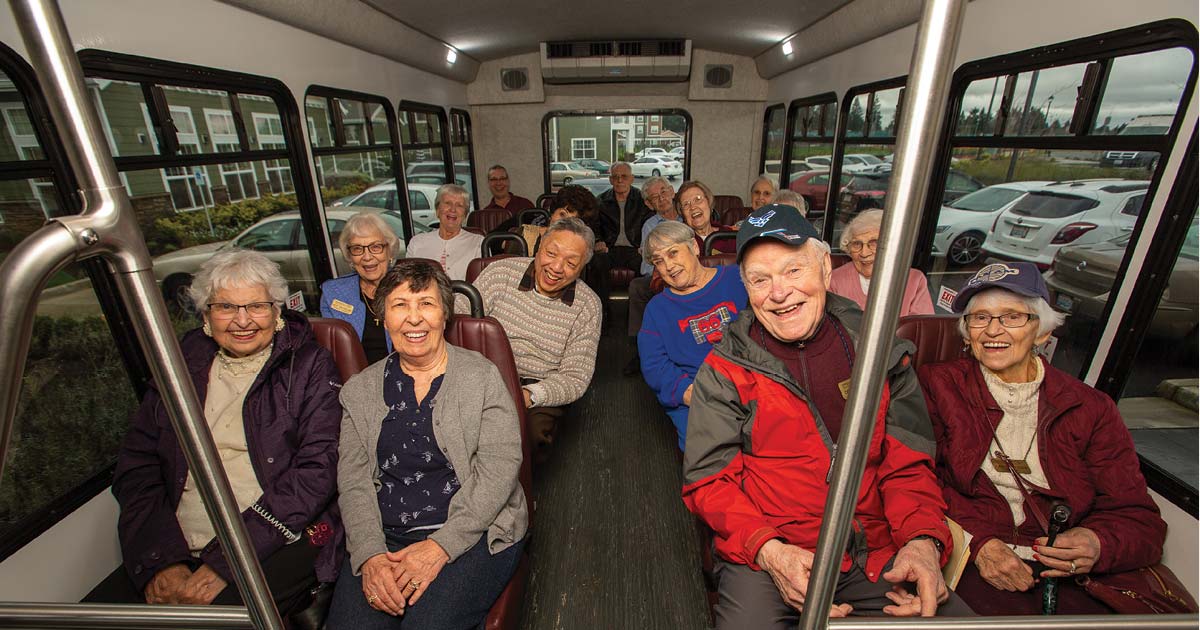Choosing independent senior living can be a smart financial decision for many adults. With the rise in the cost of living, it’s important to find ways to save money while still maintaining a high standard of living. Independent senior living communities offer a range of benefits that can help you do just that.
Explore how choosing all-inclusive independent living can save you money in the long run, from reduced maintenance costs to included amenities and services. The key to gaining financial freedom in your retirement is to find a balance between your desired lifestyle and financial security. We will explain the benefits of independent senior living and how it can stretch your retirement budget, providing not just a comfortable home but also financial freedom.
Statement of Fairness: Considering senior living options for yourself or a loved one? We’re here to help at every step. And even though we specialize in independent living communities, our goal is for YOU to find your best path to gracious retirement living, and part of how we achieve that is by providing reliable information on all types of senior living, not just the ones we offer. When our offerings serve as useful illustrations to a specific topic, you can find that information in the attached sidebar.
Disclaimer: This content is not intended as financial advice. Remember to review your plans and budgets with a licensed financial professional when making significant financial decisions.
What Is Independent Senior Living?
Independent senior living refers to residential communities designed specifically for adults over the age of 55, and in some cases over the age of 62, who can live a lifestyle without the intervention of care services offered by the community where they reside. These communities may offer a range of housing options, from apartments and condominiums to cottages or patio homes, where individuals are able to maintain their independence and access various amenities and services.
Unlike assisted living communities, residents in independent senior living communities do not receive care and assistance with activities of daily living as coordinated by the community, but they may promote their own independence through the assistance of third-party providers or family members. The social opportunity and added convenience of a maintenance-free lifestyle can be a highly appealing introduction to senior living for many people.
Why Choose Independent Living Sooner Rather Than Later
Imagine a community where you don’t have to worry about cooking meals, washing dishes or mowing the lawn. Where exercise classes, social activities and clubs are offered on-site. And where your friends live right next door. That’s independent living. And choosing independent living when you’re younger allows you to take full advantage of all the great offerings. These communities are not just places to reside; they are vibrant hubs of activity, social connection and enrichment.

Independent living communities offer a myriad of benefits to residents, including maintaining independence, enhancing social interactions, focusing on health and wellness, ensuring safety and security, enjoying a stress-free living environment, and achieving peace of mind through careful financial planning. By making this choice early, older adults can truly embrace the freedom and fulfillment that their well-deserved retirement years have to offer.
How Can Independent Senior Living Make My Money Go Further?
One of the biggest expenses in retirement is housing. If you own a home, you’ll have to pay for property taxes, homeowners insurance and home maintenance. Even if you don’t have a mortgage, these costs can add up, especially as you get older and need more assistance with home maintenance.
Predictable Monthly Expenses
Financial planning becomes easier with predictable monthly expenses. Independent senior living communities usually have a fixed monthly rate that covers housing, utilities, maintenance, dining and amenities. This predictability allows you to budget effectively, eliminating unexpected costs and providing peace of mind.
All-Inclusive Amenities
Independent senior living communities typically offer all-inclusive amenities such as fitness centers, libraries, community events, transportation services and even on-site dining. These amenities are designed to enhance your quality of life and eliminate the need for additional expenses. Instead of paying for a gym membership, entertainment or dining out, residents often have these services included in their monthly rent, saving them money in the long run.

Social and Recreational Opportunities
Maintaining an active social life and engaging in recreational activities are essential aspects of a fulfilling retirement. Independent living communities offer a variety of social events, clubs, and classes, often at no extra cost. These activities not only enrich your social life and promote health and wellness, but they also prevent the need for costly entertainment options outside the community.

Downsizing and Cost Efficiency
One of the significant advantages of independent senior living is rightsizing, also known as downsizing. These communities often offer smaller, easier-to-manage apartments or cottages. By downsizing, you reduce maintenance costs, property taxes and utility bills, freeing up a considerable portion of your budget for other necessities or leisure activities.
How To Pay for Independent Living
Most adults pay for independent living using personal funds, such as retirement savings, pensions and income from investments. Some may also be eligible for government assistance or private insurance programs that can help cover the cost of independent living. Here are some of the most common ways to pay for independent living:
- Personal funds. This includes retirement savings such as 401(k)s and IRAs, as well as pensions and income from investments.
- Government assistance. The U.S. Department of Housing and Urban Development (HUD) offers several programs that can help low-income seniors afford independent living, including Section 202 subsidized housing and the Section 8 Housing Choice Voucher Program.
- Private insurance. Some long-term care insurance policies may cover the cost of independent living, especially if you require some level of personal care assistance.
- Life settlements. A life settlement is a financial transaction in which you sell your life insurance policy to a third party for a lump sum of cash. This can be a way to free up money to pay for independent living, but it’s important to weigh the pros and cons carefully before making a decision.
- Consider a roommate. Choosing to share an apartment with a roommate in senior living cuts the cost of one of the biggest monthly expenses in retirement: rent. You’ll also get companionship and have less space to take care of.
- Talk to a financial advisor. Ultimately, navigating your retirement journey with confidence requires expert guidance. Connecting with a seasoned financial advisor is the most proactive step you can take. These professionals specialize in crafting personalized plans tailored to your retirement goals. By consulting with a financial advisor, you gain invaluable insights into structuring your finances effectively. They can assist you in formulating a strategy for covering the costs of independent living with a plan tailored precisely to your unique needs.
Tips for Saving Money in Independent Senior Living
Independent senior living communities offer a great way for adults to maintain their independence while enjoying the benefits of community and support. However, the cost of independent senior living can vary widely, so it’s important to plan ahead and save money where you can. Here are some tips to keep in mind:
- Choose a community that fits your budget.Not all independent living communities are created equal. Some communities are more expensive than others, so it’s important to shop around and find a community that fits your budget.
- Take advantage of discounts and promotions. Many independent living communities offer discounts to residents. For example, you may be able to get a discount on your rent if you sign a long-term lease.
- Take advantage of community resources. Many independent living communities include various activities, amenities, and services in the monthly rent. This includes transportation services, wellness programs, and educational classes. Take advantage of these resources to save money and stay healthy.
Maximize Your Retirement Budget Today
Independent senior living offers not just a comfortable and enriching lifestyle, but also significant financial advantages. By downsizing, enjoying all-inclusive amenities and services, benefiting from predictable expenses, and engaging in communal social activities, you can stretch your retirement budget further than you might have thought possible.
It’s not just a matter of saving money – it’s about embracing a fulfilling lifestyle that enhances your overall well-being while securing your financial future. Consider exploring independent senior living options to make the most of your retirement years both financially and emotionally.
Disclaimer: This content is not intended as financial advice. Remember to review your plans and budgets with a licensed financial professional when making significant financial decisions.
DID YOU ENJOY WHAT YOU JUST READ?
Join our exclusive community and subscribe now for the latest news delivered straight to your inbox. By clicking Subscribe, you confirm that you agree to our terms and conditions.
All the Things You Need
To Thrive at Olympus Ranch

Olympus Ranch Gracious Retirement Living features an active lifestyle, with a full complement of amenities and services so you can enjoy your retirement and spend more time with family and friends. Included in the monthly rent are these benefits:
- A private apartment with a choice of multiple floor plans
- Chef-prepared meals
- Weekly housekeeping and linen service
- Planned activities and social events
- Basic cable service
- Utilities (electricity, gas, water and sewer)
- Local transportation
Worry-Free Retirement at

At Wilshire Estates Gracious Retirement Living, we take care of the stress that comes with owning a home so that residents are only responsible for their monthly rent and any additional services they need or have chosen. From weekly housekeeping and linen service to daily chef prepared meals, we’ve got it. Residents can spend their time trying a new fitness class, visiting a local café or socializing during happy hour.
UP NEXT

9 min read
How to Protect Your Retirement Savings From Health Care Expenses
Our goal is to empower you with the knowledge and tools needed to make informed decisions, so you can plan for your health care expenses with confidence. Whether you’re about to retire or have already taken that leap, this guide will provide valuable insights and strategies that can help you achieve a secure retirement.


Frequently Asked Questions:
What is independent senior living and who is it for?
Independent senior living refers to residential communities designed for adults typically over the age of 55 or 62 who are able to live independently without the need for daily care services. These communities offer a range of housing options and provide amenities and social activities that support an independent lifestyle.
How can independent senior living help stretch my retirement budget?
Choosing independent senior living can reduce major expenses like home maintenance, property taxes and utilities, especially if you downsize from a larger home. Many communities offer all-inclusive pricing that covers housing, amenities, social activities and sometimes even meals, which can help you better manage your monthly expenses and avoid unexpected costs.
What are common ways to pay for independent senior living?
Most people use personal funds like retirement savings, pensions and investment income to pay for independent living. Some may qualify for government assistance programs like HUD’s Section 202 or Section 8. Other options include life settlements or sharing an apartment with a roommate to reduce costs. Consulting a financial advisor is recommended to create a plan tailored to your needs.
FIND YOUR COMMUNITY
Related Articles
STORIES, INSIGHTS & RESOURCES
As you and your loved ones navigate the exciting opportunities retirement presents, thoughtful planning is key. Stay informed with empowering articles for seniors covering health, lifestyle, finance and more.




Chronicles Of The Heart
RESIDENTS SAY INDEPENDENCE IS A TOP PRIORITY
Below, residents explain how much they appreciate the freedom they experience at our independent living community. It’s empowering to continue to make your own decisions, and you’re free to create your day around your personal interests.

